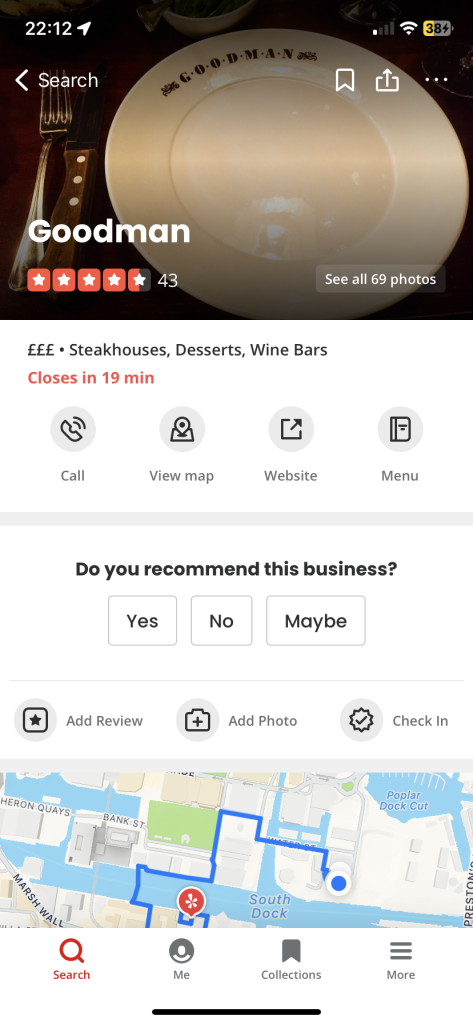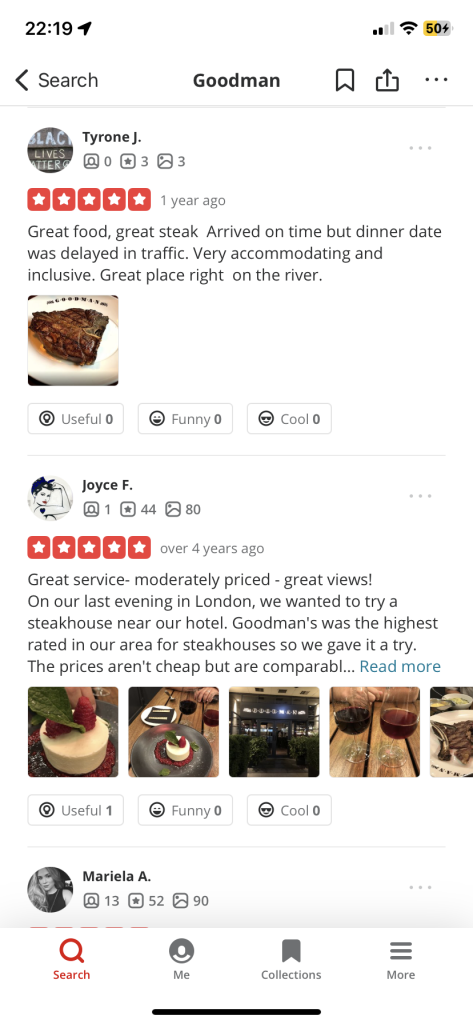Yelp, founded in 2004, is the largest business review site in the United States for restaurants, shopping centres, hotels, travel, and other services, where users can rate companies, publish reviews, exchange shopping experiences, and more. Yelp customers can rate and evaluate their items or services on a one- to five-star scale. Businesses can also add specials and change contact information, operating hours, and other basic listing information. Users can respond to reviews, schedule activities, and discuss their personal lives in addition to providing reviews. Similarly, Yelp collaborated with Opentable in 2010 to provide a reservation service that permits restaurant bookings at any time. (However, this option does not appear to be available on Yelp in London.)

When I go to an unfamiliar city, Yelp is invariably the first app I opened every time. In this app, I can search not only for good restaurants, but also for daily service shops such as “spas& salons”, “auto services”, etc. When we open a restaurant page, the images, call, website, menu and map appear on the top, besides that, with a specific navigation information further down the page. Yelp covers all aspects of people’s daily life and entertainment, providing a more convenient platform for finding exactly what you need.


The function of Yelp is that it allows users to express their opinions and views freely, providing a platform for free speech. In this model of peer-to-peer marking, people are more likely to trust a review that is not posted on an official account because they subconsciously believe it to be accurate and credible. In Yelp, you do not need to log in to your account to see all the information about the restaurant and the reviews below; you only need to log in when you need to post a review, which protects the user’s privacy to a certain extent and prevents the platform from using the user’s preferences to prioritize the needs. After logging in to Yelp with your account, you can see the personal information of all posters on all merchants’ screens, which gives you an excellent choice to judge the authenticity of the reviews.
Benefits between users, businesses and platform
The relationship between economic resources and power is highlighted in Lawrence and Laybourn-Langton’s argument for the enclosure of digital information. As a mutually beneficial platform, Yelp initially allows users to share reviews and promote selective reviews and consumption. Secondly, for businesses on the forum, in 2011 found that each “star” in a Yelp rating affected the business owner’s sales by 5–9%. The increase from 3.5 to 4 stars on Yelp resulted in a 19% increase in the chances of the restaurant being booked during peak hours.

This is also an opportunity for them to improve the quality of their business based on reviews. A business owner can “claim” a profile, which allows them to respond to reviews and see the reports. In some cases, they have the right to respond to user comments to resolve their complaints quickly and make appropriate improvements based on the reviews. They also have the right to remove negative thoughts to reduce the number of stars their business lost. Finally, the Yelp platform’s primary revenue is divided into an advertisement, transaction revenue and other services. In 2018, 97% of its revenue was earned due to its reliance on advertising. Yelp’s advertising revenue is comprised of all advertising items sold by its partners and company listings. Yelp has created a variety of tools and features to ensure that transactions between consumers and companies are properly facilitated. In 2018, transaction revenue accounted for around 1% of Yelp’s total revenue. Yelp also makes a lot of money from its subscription services. Its non-transaction and non-advertising arrangements are the same. Other services revenue accounted for around 2% of Yelp’s total revenue.
Through this mode of operation, the mutual benefits of users, businesses and the platform are connected together, thus, product data is transformed into public data to be utilised and formed a common-based for shared giants or captured for the benefit.